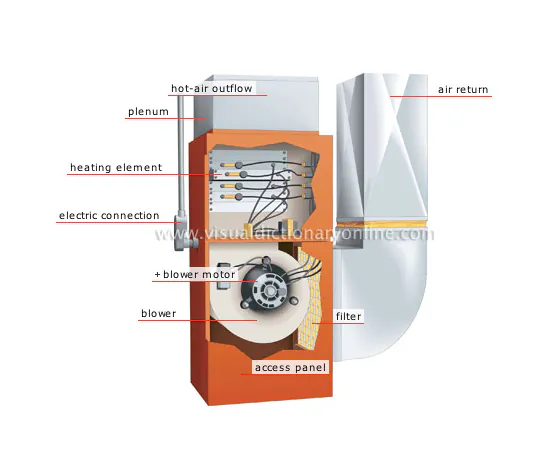1. Understand Your Heating Needs
- Size of Your Home: The size of your home directly impacts the size of the furnace you’ll need. A furnace that’s too small won’t efficiently heat your home, while one that’s too large can lead to inefficiency and higher energy costs. Consult a professional to perform a load calculation, which determines the appropriate furnace size based on your home’s square footage, insulation, and climate.
- Insulation and Home Layout: Well-insulated homes require less heating power compared to poorly insulated ones. Additionally, the layout of your home—whether it has open spaces or multiple floors—can affect how heat circulates.
2. Consider Efficiency Ratings
Electric furnaces come with various efficiency ratings, which indicate how effectively they convert electricity into heat. Look for the following ratings:
- AFUE Rating: The Annual Fuel Utilization Efficiency (AFUE) rating measures the efficiency of your furnace. Higher AFUE ratings indicate better efficiency. For electric furnaces, you’ll want an AFUE rating of at least 95%. This ensures that most of the electrical energy is converted into heat, minimizing energy waste.
- ENERGY STAR® Certification: Furnaces with the ENERGY STAR® label meet stringent efficiency criteria set by the U.S. Environmental Protection Agency. Choosing an ENERGY STAR® certified furnace can lead to significant energy savings over time.
3. Evaluate Different Types of Electric Furnaces
There are several types of electric furnaces, each with its own set of features:
- Forced Air Furnaces: These are the most common type of electric furnace. They work by heating air in a central unit and then blowing it through ducts to warm your home. They are suitable for homes with existing ductwork.
- Baseboard Heaters: Baseboard heaters are electric furnaces that are installed along the baseboards of rooms. They provide zone heating, which can be beneficial if you want to heat specific areas of your home rather than the entire house.
- Wall Heaters: These compact units are mounted on walls and are ideal for small spaces or supplemental heating in specific areas. They are less common for whole-home heating but can be effective in certain situations.
4. Choose a Furnace with Advanced Features
Modern electric furnaces come with various features designed to enhance comfort and efficiency. Consider the following features:
- Variable-Speed Blowers: A variable-speed blower adjusts the airflow to match your heating needs, providing more consistent temperatures and reducing energy consumption. This feature can enhance comfort and efficiency.
- Smart Thermostats: Integrating a smart thermostat with your electric furnace allows you to control your home’s temperature remotely. Smart thermostats can also learn your heating preferences and adjust settings automatically for optimal comfort and energy savings.
- Zoning Capabilities: Some electric furnaces come with zoning capabilities, allowing you to heat different areas of your home independently. This can be particularly useful if you have rooms that are used more frequently than others.
5. Assess Installation and Maintenance Costs
The cost of purchasing an electric furnace is just one part of the equation. Consider the following additional costs:
- Installation Costs: Professional installation is essential for ensuring your furnace operates efficiently and safely. Get quotes from multiple contractors and ensure they are licensed and experienced. Improper installation can lead to performance issues and higher energy costs.
- Maintenance Costs: Regular maintenance is crucial for the longevity and efficiency of your electric furnace. Choose a model with easily accessible components and consider a maintenance plan to keep your furnace in top condition.
See Also Top Signs Your AC Needs Repair in Spring, TX: Don’t Ignore These Warning Signals
6. Check Manufacturer’s Warranty
A good warranty can provide peace of mind and protect your investment. Look for furnaces with comprehensive warranties that cover both parts and labor. A longer warranty often indicates the manufacturer’s confidence in the product’s durability.
7. Read Reviews and Seek Recommendations
Researching customer reviews and seeking recommendations can provide valuable insights into the performance and reliability of different furnace models. Look for reviews from homeowners with similar heating needs and consult with HVAC professionals for their recommendations based on your specific requirements.
8. Consider Environmental Impact
While electric furnaces are generally cleaner than fossil fuel-based systems, their environmental impact depends on the source of the electricity used. If possible, choose a furnace that is compatible with renewable energy sources, such as solar power, to further reduce your environmental footprint.
9. Consult with a Professional
Ultimately, choosing the right electric furnace for your home can be complex. Consulting with a professional HVAC technician can help you make an informed decision. They can assess your home’s heating needs, recommend suitable models, and ensure proper installation.
Conclusion
Selecting the right electric furnace involves considering factors such as your heating needs, efficiency ratings, furnace types, advanced features, and overall costs. By following these expert tips and consulting with professionals, you can ensure that you choose an electric furnace that provides reliable, efficient, and cost-effective heating for your home. For quality and expert service in Houston, TX, consider electric furnaces by KAC Express. Their expertise ensures that you get a furnace perfectly suited to your needs, along with professional installation and maintenance. Investing in the right furnace not only enhances comfort but also contributes to long-term energy savings and environmental sustainability.



0 Comments